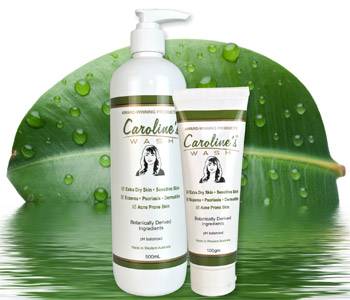Say No To Sensitive Skin With Caroline.s Wash

Clean and Green – turn sensitive skin into happy, healthy skin the natural way
Did you know that around 45% of the population has dry, and or sensitive skin? It varies in severity from the occasional dry patch to chronic skin disorders, which can be completely debilitating.
People with sensitive skin are more vulnerable to acne, rosacea, eczema and contact allergens, not to mention all the stinging and itchy dryness that accompany the condition. In a lot of cases, sensitive skin is something a person will have to deal with their whole lives.
When diagnosing sensitive skin, dermatologists look for:
Skin reactions such as pustules, skin bumps, or skin erosion
Very dry skin which doesn't properly protect nerve endings in the skin
A tendency toward blushing and skin flushing
For people who suffer any type of skin problem, whether mild of severe, cleansing and moisturising your skin properly can alleviate much of the discomfort, reduce the frequency of outbreaks, inflammation and itchiness and prevent possible skin infections.
A simple, two-step routine is best when it comes to sensitive skin.
'Often people end up with more problems from over treating the skin," says Caroline Monet, Founder of Caroline's Skincare. 'A simple and uncomplicated routine is often the key to managing sensitive and problem skin. A simple wash and a hydrating moisturiser can be sufficient."
It's also advisable to use products specially formulated for sensitive skin. A product like Caroline's Wash doesn't only clean the skin; it replenishes and hydrates as well as being soothing to any irritation that may be present.
As people with sensitive and problem skin will tell you, looking after their skin, especially during flare-ups can be tricky, but it can be done, just follow Caroline's sensitive skin tips.
Say No To Sensitive Skin
Dab, not scrub. It may feel great to scrub your skin until it shines, but the oils you're scrubbing off your body are part of what keeps your skin healthy. While it's true that exfoliating dead skin cells and oil is important, dead skin cells form the barrier between your dermis (the under part of your skin) and the outside world. And sebum, the oil your skin produces, guards against skin cells' dehydration.
If your skin is sensitive, especially on your face, it is best to avoid using hot water in this area where possible. Sensitive skin can become red and blotchy acne rosacea or eczema at lot worse.
Try having a final rinse after bathing with cooler water or use a cool flannel on your face. Bear in mind that our heads hold at least 70% of our total body heat. So cooling it down can often be a good idea anyway.
The best thing to do if your face in particular becomes inflamed try using a cold compress such as a wet flannel that has been placed in the freezer, this will certainly have a calming effect on the skins surface. In some cases it may be necessary to visit your doctor who may prescribe anti-inflammatory medication to help ease the symptoms.
Always moisturise after washing your hands and body, sensitive skin often lacks the nutrients in the epidermal layer which is the body's own natural defense mechanism which helps to protect our skin so we need to replenish this ourselves.
Avoid products that contain artificial colors and synthetic fragrances: Artificial colors and fragrances can cause allergic reactions and increase your skin's sensitivity.
Choose skin care products that are specially formulated for sensitive skin.
Always read the labels on the back of skin-care products. Knowing what the ingredients are means knowing what to avoid. Here's a list of some of the more common chemicals that can irritate, sting and dry out sensitive skin:
Acetone
Alcohol
Witch hazel
Alpha hydroxy acids (glycolic acid)
Benzoic acid
Bronopol
Cinnamic acid compounds
Dowicil 200
Lactic acid
Propylene glycol
Quaternary ammonium compounds
Sodium lauryl sulfate
Sorbic acid
Urea
So with a little extra care, and healthy, nourishing products, you can get your sensitive skin under control
Caroline's Cream 500ml – RRP: $32.95/Caroline's Cream 100g – RRP: $17.95
Caroline's Cream is specially formulated for eczema, dermatitis and psoriasis. It offers long lasting hydration. It has a high concentration of herbs and oils also containing natural anti-ageing properties. It is truly the secret to silky smooth, supple, healthy, hydrated and problem free skin this summer. Also, should you suffer from serious skin problems this really is your saviour.
Caroline's Wash
New, Improved & Unique - Caroline's Wash is specially formulated for people with eczema, dermatitis, psoriasis, extra dry, sensitive or acne prone skin.
Caroline's Wash is manufactured from high quality botanically derived ingredients, contains no petrochemicals or S.L.S. ingredients, fragrances, nut products an is not tested on animals.
Caroline's Wash is fragrance free; it is used by people of both genders, regardless of age or skin type.
Caroline's Wash doesn't only clean the skin; it replenishes and hydrates it as well as being soothing to any irritation that may be present.
Caroline's Wash contains an unusually high number or ingredients as well as an unusually high concentration of herbs and oils, every one of them effective in its own way.
Caroline's Wash 500ml: RRP $31.95
Caroline's Wash 100g: RRP $17.95
Caroline's Skincare products contain no nut products, fragrances, lanolin, propylene glycol or dairy, are not tested on animals and are full of natural, healing ingredients.
Caroline's Skincare products are available from Pharmacies, Health Food Stores, Healthcare Practitioners, Hairdressing Salons, and Podiatrists throughout Australia.
See www.carolineskincare.com for stockist info or phone 1800 369 273
MORE





